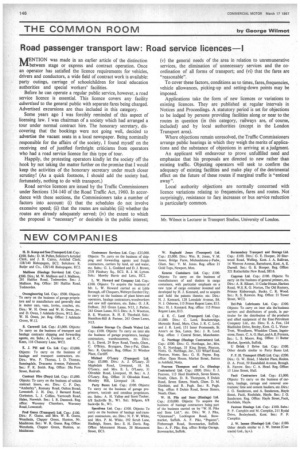THE COMMON ROOM by George Wilmot
Page 156

If you've noticed an error in this article please click here to report it so we can fix it.
Road passenger transport law: Road service licences-I
MNTION was made in an earlier article of the distinction between stage or express and contract operation. Once an operator has satisfied the licence requirements for vehicles, drivers and conductors, a wide field of contract work is available: party outings, carriage of schoolchildren for local education authorities and special workers' facilities.
Before he can operate a regular public service, however, a road service licence is essential. This licence covers any facility advertised to the general public with separate fares being charged. Advertised excursions are thus included in this category.
Some years ago I was forcibly reminded of this aspect of licensing law. F was chairman of a society which had arranged a tour under normal contract hire. The honorary secretary, discovering that the bookings were not going well, decided to advertise the vacant seats in a local newspaper. Being nominally responsible for the affairs of the society, I found myself on the receiving end of justified forthright criticisms from operators who had a road service licence for this type of tour.
Happily, the protesting operators kindly let the society off the hook by not taking the matter further on the promise that I would keep the activities of the honorary secretary under much closer scrutiny! (As a quick footnote, I should add the society had, fortunately, nothing to do with transport.) Road service licences are issued by the Traffic Commissioners under Sections 134-140 of the Road Traffic Act, 1960. In accordance with these sections, the Commissioners take a number of factors into account: (i) that the schedules do not involve excessive speed; (ii) that the routes are suitable; (iii) whether the routes are already adequately served; (iv) the extent to which the proposal is "necessary" or desirable in the public interest; (v) the general needs of the area in relation to unremunerative services, the elimination of unnecessary services and the coordination of all forms of transport; and (vi) that the fares are "reasonable".
To cover these factors, conditions as to times, fares, frequencies, vehicle allowances, picking-up and setting-down points may be imposed.
Applications take the form of new licences or variations to existing licences. They are published at regular intervals in Notices and Proceedings. A statutory period is set for objections to be lodged by persons providing facilities along or near to the routes in question (in this category, railways are, of course, included) and by local authorities (except in the London Transport area).
Where objections remain unresolved, the Traffic Commissioners arrange public hearings in which they weigh the merits of applications and the substance of objections in arriving at a judgment.
An applicant will endeavour to prove unfulfilled need and emphasize that his proposals are directed to new rather than existing traffic. Objecting operators will seek to confirm the adequacy of existing facilities and make play of the detrimental effect on the future of these routes if marginal traffic is "enticed away".
Local authority objections are normally concerned with licence variations relating to frequencies, fares and routes. Not surprisingly, resistance to fare increases or bus service reduction • is particularly common.
Mr. Wilmot is Lecturer in Transport Studies, University of London.








































































































































































































